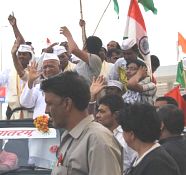
The uncertainty is on multiple counts. For one, several hurdles have to be crossed before a workable Bill can be hammered out. It has to be decided which part of the Central Bureau of Investigation (CBI) will report to whom.
A Lok Pal an ombudsman to keep a watchful eye on the highest political executives, administrators and judges will need an investigating arm answerable to itself. Also, where will the remit of the Central Vigilance Commissioner (CVC) stop?
If the entire machinery of the central government comes under the Lok Pal, then its task will become unmanageable. A similar concern has been voiced by Aruna Roy over the need to not burden the Lok Pal with matters like disputes over dues under the employment guarantee programme. Then again, who will try a superior judge?
The focus needs to be on creating a super ombudsman to investigate complaints against the topmost functionaries. The super ombudsman will investigate, have the required judicial authority at every stage and recommend prosecution which will be mandatorily acted upon.
Equally, care must be taken to avoid creating a super authority that has more powers and greater remit than it can handle. And once the Lok Pal Bill is agreed upon, there will be a need to look afresh at the CBI and the CVC to avoid a clash.
Also, once the Lok Pal pursues allegations of corruption against the high and the mighty, it will soon become clear that the system has to be changed so that corruption does not sprout in the first place.
This also points to the need for changing the way elections are conducted. In one of the most forthright statements in the last few days the Chief Election Commissioner (CEC) has pointed out, "If you spend more than Rs 2 crore (Rs 20 million) to contest an election to become an MLA, you will surely earn Rs 20 crore (Rs 200 million) because you have to pay back
Elections unfortunately have become the biggest area of corruption."
The demand for change is widespread. A group comprising some of the most distinguished retired civil servants (N C Saxena, Arundhati Ghosh, Keki Daruwalla, Jagdish Khattar and others) has moved a public interest litigation before the Supreme Court for reform in the administrative services by creating an independent civil service board, fixed tenures for civil servants and the need to record in writing all instructions, orders and suggestions, and depoliticise the management of transfers, postings, rewards and punishments.
Various government-appointed committees have suggested such changes over decades but no action has been taken so far.
The UPA government is having to carry the can for the sins of the entire political class of which it is a significant part. But there is no doubt that the major political parties, including the BJP and the Left, are equally guilty of perpetuating this situation.
Neither party thought it fit to bring forward an adequate Lok Pal Bill and see it defeated, if only to prove the point that "left to us, we would change the system".
On Hazare's satyagraha, the BJP first sang one tune and then quickly changed it once it sensed which way the wind was blowing. Corruption in public life grew from the political culture that Indira Gandhi initiated with the Congress split of 1969.
However, if civil society is a voice today and if the right to information is one of its most potent weapons, then the credit goes to UPA and the Congress president's National Advisory Council.
Former Karnataka chief minister H D Kumaraswamy has declared, "If Mahatma Gandhi was alive today, he would have either involved in the corruption, or would have quit politics. Contesting elections and pursuing politics without corruption is impossible in today's context."
"The model has failed. The government will not deliver till we make it deliver," says the Comptroller and Auditor General, whose department's labours over the 2G spectrum allocation have ignited the current public revolt against the present system.
It is being argued that no matter how popular Hazare and the present stalwarts of civil society may be, they do not have the legitimacy that elected representative in a democracy do.
So, systemic change has to be brought by legislators, not extra-constitutional elements. Simultaneously, however, you have the CEC declaring that when big money vitiates the election process, when false affidavits are routinely sworn and 40 per cent of elected representatives have serious criminal cases pending against them then you cannot expect such a system to change itself.
Change or the impetus for it has to come from outside the system. Then the keepers of the system will fall in line.